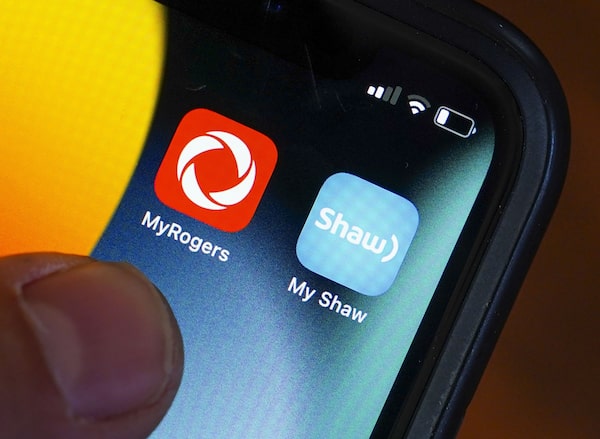
Counsel for Rogers RCI-B-T and Shaw SJR-B-T have cautioned that the deal could fall apart if it does not close by the deadline of Jan. 31.Sean Kilpatrick/The Canadian Press
The Competition Bureau will face off against Rogers Communications Inc. and Shaw Communications Inc. at the Federal Court of Appeal later this month over the Competition Tribunal’s decision to permit a proposed $20-billion deal between the telecoms.
The bureau’s appeal of the decision, which is scheduled for Jan. 24, leaves little time for the judge to rule on whether the decision should be overturned and for the telecoms to secure the final approval needed to close the takeover by their deadline of Jan. 31.
Counsel for Rogers RCI-B-T and Shaw SJR-B-T have cautioned that the deal could fall apart if it does not close by then. Jonathan Lisus, a lawyer representing Rogers, wrote in a letter to the Federal Court on Monday that there is a “significant risk that the transaction will not proceed in its current form, or at all” if the deadline is not met.
The Competition Tribunal concluded, after a month-long hearing that included evidence from 40 witnesses, that the deal, which would see Quebecor Inc.’s QBR-B-T Vidéotron Ltd. acquire Shaw’s Freedom Mobile for $2.85-billion, is unlikely to result in substantially higher cellphone bills. Freedom is Canada’s fourth-largest wireless carrier, serving 1.7 million customers in Ontario, Alberta and British Columbia.
The bureau argues that the tribunal, which issued its decision late last year just 15 days after final arguments were heard, made legal errors in its rush to issue a judgment. The tribunal is a quasi-judicial body that adjudicates cases brought by the bureau, an independent law-enforcement agency that seeks to protect competition in Canada.
During a hearing at the Federal Court of Appeal on Tuesday, Justice David Stratas said there will be a stay in place preventing the takeover from closing until the court issues its ruling. He also added Quebecor Inc.’s Vidéotron Ltd. as a respondent in the appeal.
The takeover still requires approval from federal Industry Minister François-Philippe Champagne. Mr. Champagne has said that he will wait for the legal process to play out before deciding whether to allow the transfer of Shaw’s wireless licences to Vidéotron.
Jonathan Hood, a lawyer for the Competition Bureau, on Tuesday requested a Jan. 30 deadline for the agency to prepare its brief, which would push the hearing into February. Mr. Hood said that Rogers and Shaw have already extended the deadline for their deal several times and could do so again.
In response, Mr. Lisus accused the bureau of taking a “cavalier” approach to the deal’s deadline and its importance, adding that Montreal-based Vidéotron has to come up with $2.85-billion to acquire Freedom, and that the telecom’s financing has not been extended past Jan. 31.
“An expert institutional tribunal has now found, as a fact, with the benefit of an exhaustive review of the evidence ... that there is public interest in consummating this transaction, because it is pro-competitive,” Mr. Lisus said.
In setting the hearing for 9:30 a.m. on Jan. 24, Justice Stratas declined Mr. Hood’s request for more time, noting that bureau has already done an “extensive briefing” before the tribunal. “I’m having difficulty understanding why it would take 27 days to reinvent the wheel,” he said.
While Shaw’s lawyer, Kent Thomson, characterized the bureau’s appeal as dealing with “very confined” and “minor” legal issues, Mr. Hood said the challenge has “profound implications for how mergers are enforced in Canada going forward.”
“The appeal is as important as it gets for merger law,” Mr. Hood said.
The alleged errors of law that the bureau cites in its appeal relate to the fact that rather than analyzing the original deal between Rogers and Shaw, the tribunal focused on the divestiture of Freedom to Vidéotron, which was only proposed after the bureau had already filed its application to block the takeover.
Legal experts have noted that such last-minute changes could make it more difficult for the bureau to argue cases in the future, given the expense and time needed to interview witnesses and collect evidence.
When appealing legal decisions, parties can claim an error of law, an error of facts or both. To appeal based on an error of law means arguing the jurists applied the wrong legal standard when considering the case. An appeal based on error of facts claims that the judge had the wrong facts, or interpreted them incorrectly.
The bureau has claimed two errors of law. First, that the tribunal acted outside its jurisdiction by considering the divestiture of Freedom Mobile alongside the original deal, and secondly, that the tribunal did so without the bureau’s consent.
Matthew Boswell, Canada’s Commissioner of Competition, contends that the tribunal should have looked at the original transaction – Rogers buying all of Shaw, including Freedom – and only then considered whether the divesture to Vidéotron resolved the problem.
Michael Osborne, a competition lawyer at law firm Cozen O’Connor, said that in doing so, the bureau is falling back on a technicality.
“It is distressing to see the Commissioner trying to win on a technicality like this,” Mr. Osborne said in an e-mail. “I think he will fail here.”